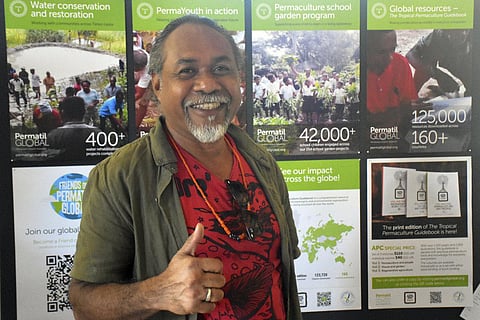

CHENNAI: Striving to save nature and uplift the local communities through his knowledge of traditional values, Eugenio Lemos of Timor-Leste is among the recipients of the Ramon Magsaysay Award this year.
Growing up in a place ravaged by civil war and Indonesian invasion, Lemos was exposed to the harsh realities of the world at an early age. His country's struggle to achieve and attain independence left a devastating economy in its wake, which saw 40% of its rural population living below the poverty line. But, Lemos saw this as an opportunity to take up the mantle of change.
Hailing from Timor-Leste, Lemos comes from a family of farmers. However, tragedy struck when he lost his father and siblings during the war. Thus, it fell upon him to help out his mother and work at the farm. He went to a local university where he studied agriculture and started a group which promoted organic farming. In 1999, Lemos met a visiting Australian permaculture trainer, which gave his life a new direction.
Permaculture is a system of sustainable agriculture that does not use chemicals. It utilises land, resources and the environment without generating waste. Lemos soon realised that a lot of aspects of permaculture were already embedded in his traditional culture. That gave him the inspiration to teach people about traditional Timorese values so as to nurture them for the coming generations. He later went on to earn his master’s degree in community development from Australia.
Permakultura Timor-Lorosa'e (Permatil) is an organisation established by Lemos in 2001. It has three programmes: A Youth Training Programme, A School Garden Programme and a Water and Natural Resource Management Programme. The Youth Training Programme draws in the youth from across the country where they learn about water and natural resource management, farming, aquaculture and agroforestry. This programme has already trained more than 5,000 people since 2008.
The School Garden Programme is implemented in public primary schools where students get the opportunity to nurture their green thumb. The students tend to the vegetable garden and learn about composting among many other things. More than 250 schools have adopted this programme. Since 2015, this programme has been integrated in their public school curriculum as well.
The Water and Natural Resource Management Programme promotes rainwater harvesting by teaching the art of building ponds and terraces that store water, recharge aquifers, and regenerate springs. This programme has been implemented in all 13 districts of the country. At the moment, the country has more than 1,000 water collection ponds. Besides, 300 springs have been brought back from the brink of destruction.
"My message to people — especially leaders of every country — is, think wisely. Don’t think only of how to create benefits for business without thinking about the impact on the environment. As world citizens, everything we do has an impact on others. We have one atmosphere, one water, one air," Ramon Magsaysay Award foundation quoted him as saying in its citation.
Lemos is an ardent believer in the power of music and is of the opinion that songs can not only soothe one's soul but also enlighten and educate an individual. As a singer and songwriter himself, Lemos hopes to spread his message about nature and people through his music.
A man who immerses himself in nature, Lemos has deep respect for his traditional knowledge. He believes it is of the utmost importance to imbibe traditional wisdom. For him, the ultimate aim shouldn't be 'food security' but 'food sovereignty' as each country must have the capacity to themselves produce sufficient food for their population.